- Bees: common myths and misunderstandings - 20/05/2020
- Worthless wetland? - 26/09/2019
- World Bee Day 2019 - 20/05/2019
This week saw the first National Biodiversity Conference in Ireland at Dublin Castle – an incredible joint effort between the National Parks and Wildlife Service of the Department of Culture, Heritage and the Gaeltacht and the Irish Forum on Natural Capital to engage people in nature. The conference aimed to get all relevant parties in the room to progress biodiversity conservation and restoration in Ireland.
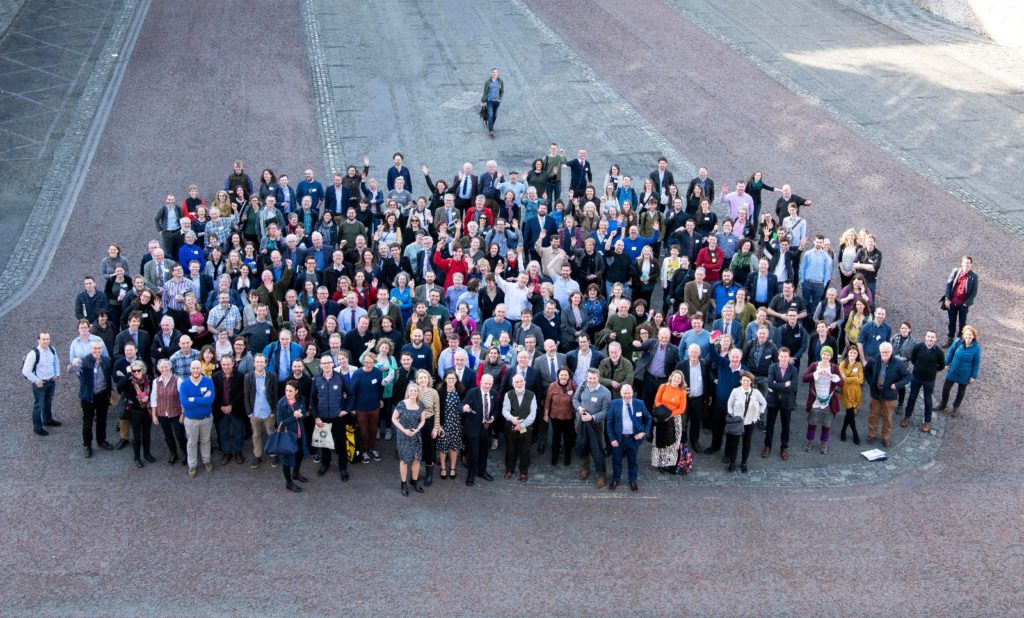
The conference opened with a powerful short film by Crossing the Line Productions “This is Ireland” which set the tone for a fantastic two days.
The conference both celebrated nature and recognised the challenges we face through its destruction. It also addressed practical mechanisms for its protection and restoration, bringing together diverse parties including government, NGOs, schools, corporates, academics, the media, and everyone in between. It was an empowering and supporting atmosphere.
The three themes of the conference were:
- Engagement
- Planning for the Future
- Investing in Nature
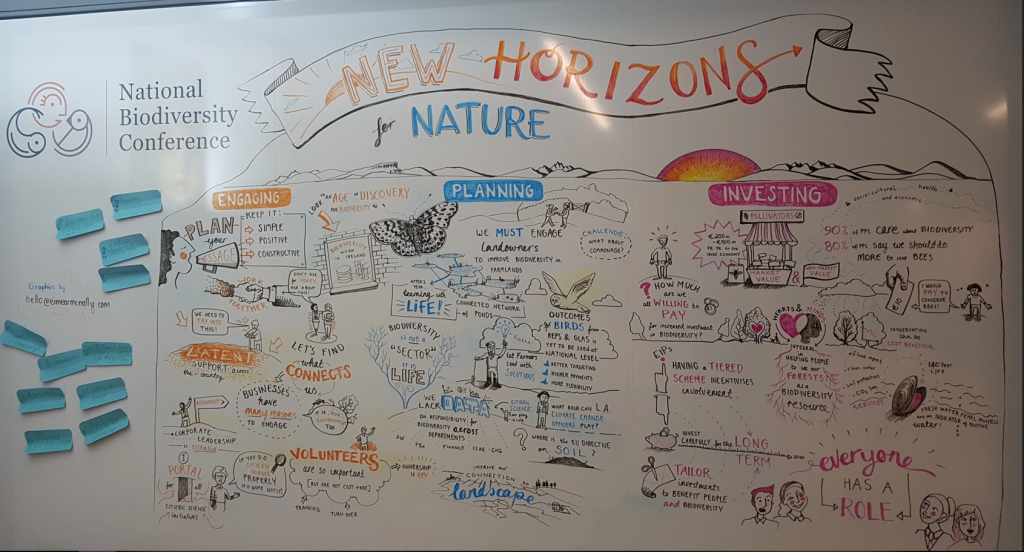
On the first morning, the conference was opened by Minister Josepha Madigan TD (Department of Culture, Heritage and the Gaeltacht). Then followed keynote addresses on each of the three conference themes from Ella McSweeney (Journalist) and Prof John Fitzgerald (Climate Change Advisory Council), and myself (my speech is here) to set the scene. One great thing about the meeting was the inclusivity – nature underpins everything, and so it was fitting that a diverse range of interest groups, practicioners and specialists were on board. This was exemplified in the Irish Wildlife Trust‘s “Together for Biodiversity” awards (sponsored by Dublin Port Company), which celebrated biodiversity action by small and large community groups, biodiversity champions, schools, farms and businesses. Applications were assessed on their biodiversity impacts, the work done, and their impact on communities, and were overall of a very high standard – there is a LOT being done for biodiversity out there.
One great thing about the meeting was the inclusivity – nature underpins everything, and so it was fitting that a diverse range of interest groups, practicioners and specialists were on board. This was exemplified in the Irish Wildlife Trust‘s “Together for Biodiversity” awards (sponsored by Dublin Port Company), which celebrated biodiversity action by small and large community groups, biodiversity champions, schools, farms and businesses. Applications were assessed on their biodiversity impacts, the work done, and their impact on communities, and were overall of a very high standard – there is a LOT being done for biodiversity out there.
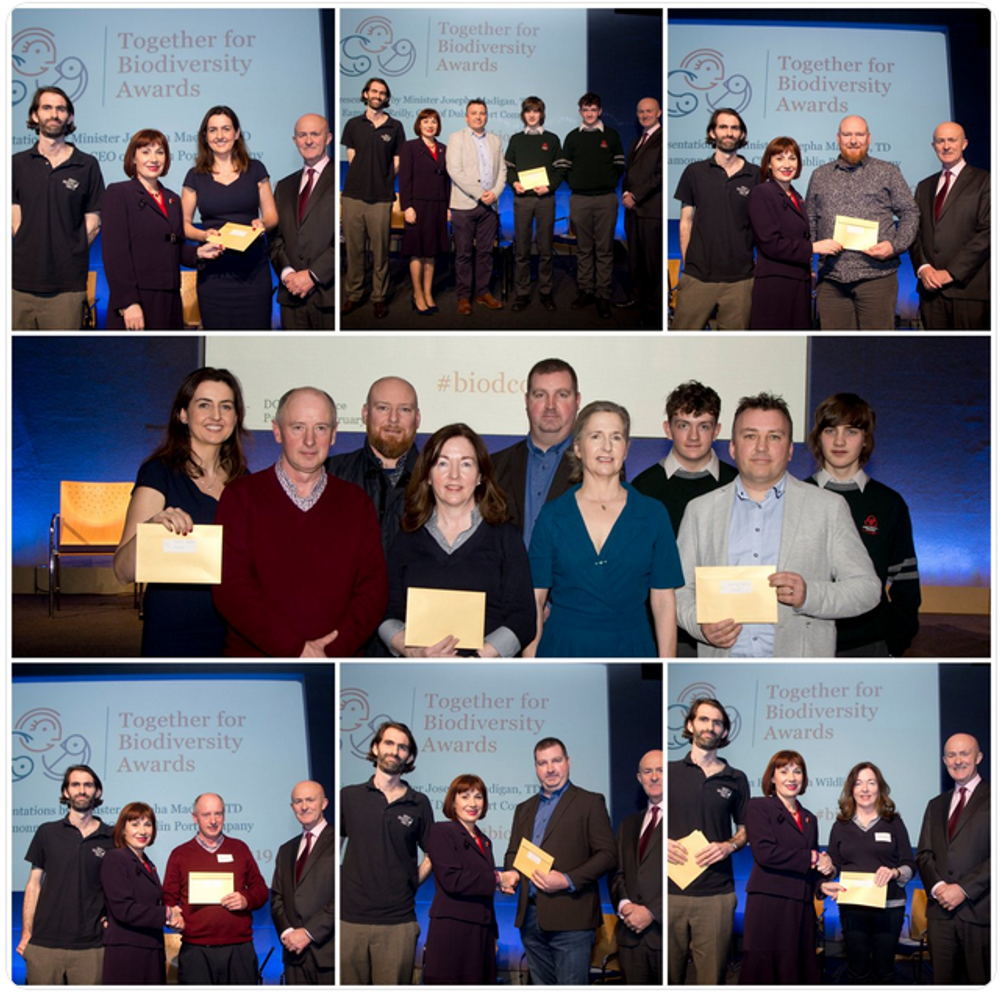
Parallel sessions were live-streamed for people who couldn’t or didn’t want to get to Dublin Castle for the main event, and who shared their thoughts via the #biodcon19 via Twitter (resulting in this hashtag trending for most of the two days).
At lunchtime, Minister Josepha Madigan TD hosted a high-level lunch, at which two other TDs (Richard Bruton – DCCAE, and Andrew Doyle – DAFM), along with other state bodies, businesses and stakeholders discussed their commitments for nature, which were announced at the end of day 2 as “seeds for nature“.
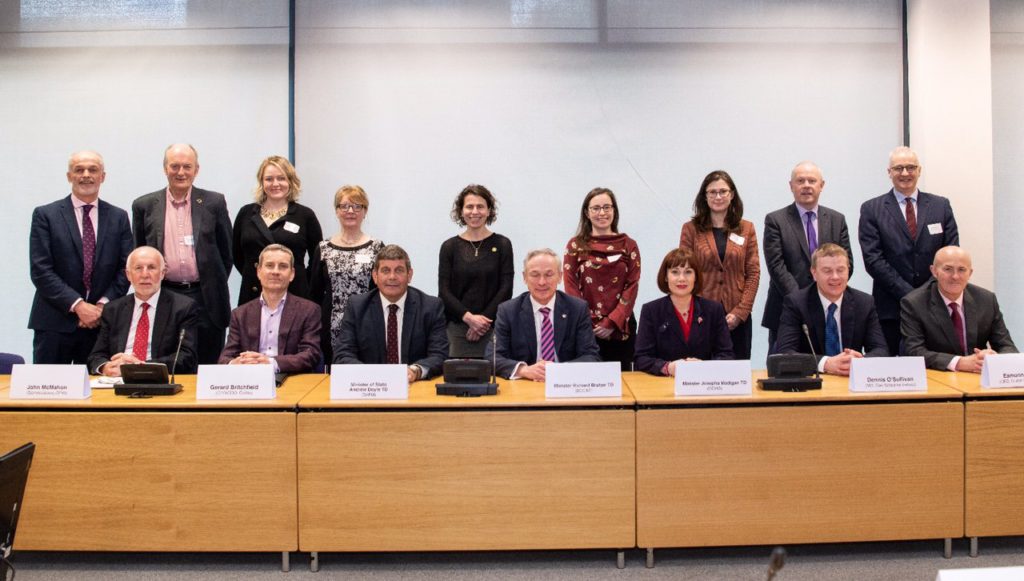
At the end of day 1, a panel discussed #1thing4nature – what is the one thing you would do to help biodiversity? This question was asked prior to the conference via social media by Yvonne Buckley and generated a lively debate among panelists on the day.
IFNC Director, Micheál Ó Cinnéide summed up the first day’s lessons learned in 7 L’s:
- Listen harder – to each other, and to nature.
- Learn – learn by doing.
- Link – networks linking people together. Linking climate and water. Linking economy and nature, culture and conservation.
- Lead – need government to lead. We have our own youth leaders, including James Dunne. We need to take responsibility and demonstrate leadership. We in this room need to lead.
- Local – local solutions. Tackle politicians on the doorstep.
- Language – some of concepts of natural capital concept can be abstract, academic and remote. Make concepts simpler – benefits and co-benefits can be articulated to people.
- Love – we love coasts, birds, the land.. the bond is still there and strong.
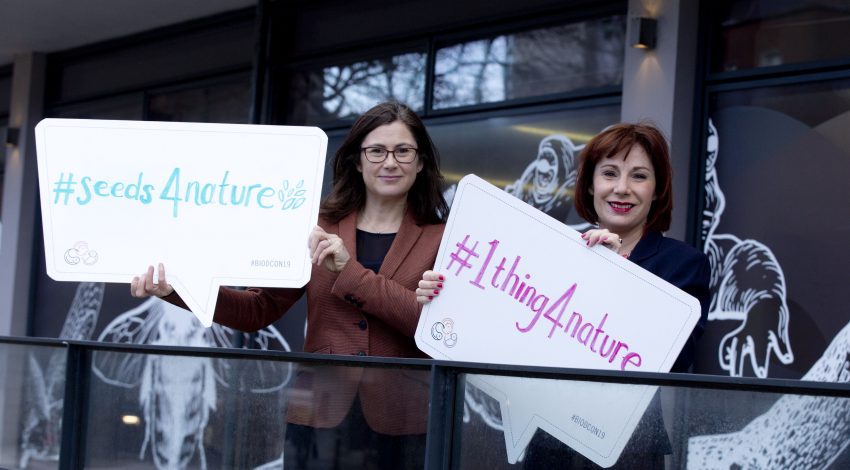
On day 2, Katherine Licken (Secretary General, Dept. Culture, Heritage and the Gaeltacht) opened proceedings in a positive, supportive manner, reminding us that the people of Ireland do care about nature, but that we still have much more to be done. She emphasised the need to protect, enhance and celebrate nature. She committed to working with other departments in government on related topics of climate change and achieving the Sustainable Development Goals, to developing a communications strategy to “love nature”, and to do do everything her Department can to use the impetus from this conference to provide new horizons for nature.
We were then very fortunate to hear from three incredible keynote speakers:
First was Inger Anderson, Director General of the IUCN, and who on the eve of her talk was confirmed as the new head of the United Nations Environment Programme, making her perhaps the most important person in the world in terms of environmental issues. She gave an excellent, impassioned speech (see here), highlighting the importance of biodiversity for our food, health, jobs and economies, the stability of society, and our identity. She also spoke about the resilience of nature – how it can bounce back if we give it a chance to. She outlined what needed to be done, and the urgency with which we must do it. Finally, she reminded us that if we “get biodiversity right”, then we can secure food and water security, climate mitigation and adaptation, ensuring indigenous people’s rights, sustainable cities and communities, and ultimately world peace. She was passionate and inspiring – a delight to listen to.
Then we heard from Humberto Delgado Rosa (Director of Natural Capital at DG Environment in the European Commission), who was also Secretary of State for Environment in Portugal. He opened by saying nature needs new horizons, and spoke about the post 2020 EU strategies. He reminded us that there aren’t three pillars of sustainability, there are three layers: the environment/biosphere/nature is our life support system, without it, we can’t support the upper two layers of society and economy. He also reminded us that climate and ecology are two sides of the same coin – they are not separate issues and solutions for one, can benefit the other. With regards to the value of nature, he emphasised that there are both intrinsic and instrumental values associated with nature, and that the latter allow us to defend it – to show that natural capital is valuable to people. He said we should get a new deal for nature at the next COP in China in 2020. The 2050 vision of living in harmony with nature should not be changed, but we should think about where we want to be in 2030, aligning our targets with the Sustainable Development agenda. That these targets need to be SMART i.e. measurable, reportable and verifiable. He also spoke of the importance of getting the national implementation of the revised CAP right, particularly with regards to the design of Eco-Schemes for Ireland, which should be results-based.
Finally, President Michael D. Higgins gave a powerful address emphasising that the current economic model is flawed – we need to connect ecology, economics and ethics. He also told us to open our minds, to talk to each other and to listen to each other. To not refer to people as “experts” but as “specialists”, to make them more accessible. He praised the conference organisers for engaging people across sectors, for moving out of our silos. He said we needed to work in an integrated way and that we need more resources to protect nature, because it underpins everything. He said our progress would be tested by the skills on the ground – we need the necessary humility of scholarship delivered into action, so that farmers can say with confidence that “I am doing this not because I have been told to, but because it is the right thing to do”. And for them to do it based on ancient wisdom as well as new information from specialists. He also praised the All-Ireland Pollinator Plan and said he was going implement this at the Aras. He said new dialogue was necessary – he empowered the people in the room – we know, we have the actions and we can teach others. He also said that good ideas can be killed by administration (don’t we all just know that!). His speech ran well over the allocated time slot, but was well worth it, and received a standing ovation from the audience.
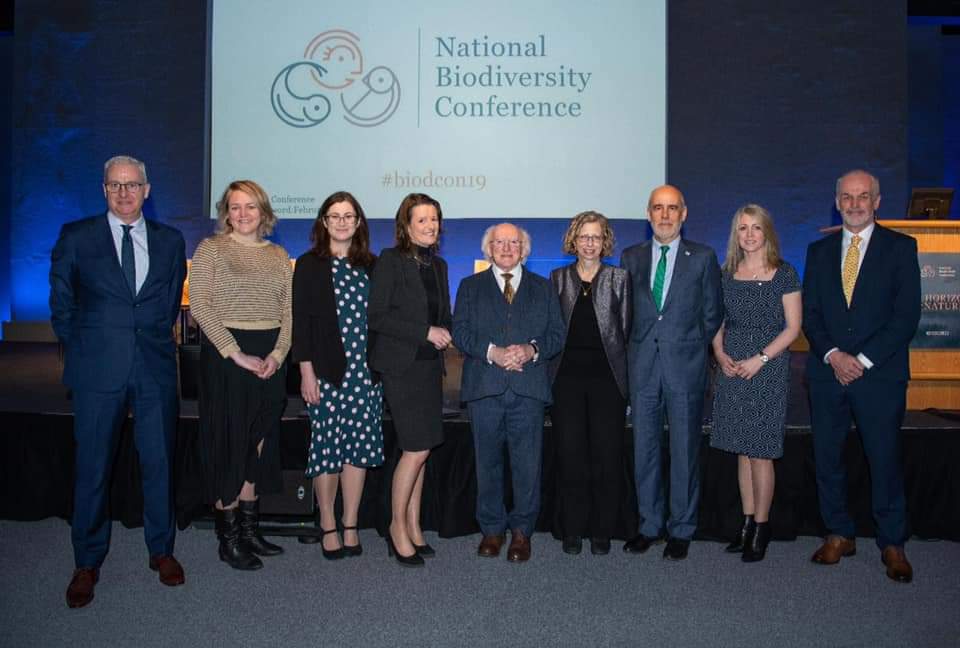
Michael Ewing (Head of Irish Environmental Pillar), and Tara Shine (Change By Degrees), patiently waited until the closing plenary session to give their impassioned presentations on the national perspective and “Our new horizons: a future perspective”.
Finally, a closing panel comprising Ella McSweeny, Andrew Jackson (UCD), Jane Stout (TCD), John O’Neill (DCCAE) and Ciaran O’Keefe (NPWS), chaired by Eugenie Regan (UNEP-WCMC), gave their sum up of the meeting, and their own personal #1thing4nature. Mine was to continue to contribute to providing the ecological evidence base, but also to work out of my comfort zone – work with other sectors and other disciplines to value, protect and restore nature. Yvonne Buckley then summed up her thoughts from the conference, and ended with a plea for the implementation of the National Biodiversity Action Plan.
The “seeds for nature” were announced at the end of the conference, before the audience once again rose to their feet with a standing ovation for conference organisers, Hannah Hamilton (IFNC) and Deirdre Lynn (NPWS). Ciaran O’Keefe closed the meeting on an upbeat note and urged us to go on, go on, go on…

The event attracted substantial media coverage, with several articles in the Irish Times, including:
Undervaluing of nature has lead to its destruction, conference told
Forty actions agreed to address Ireland’s biodiversity Crisis
Humans cannot keep destroying nature and species Higgins says
Blaming farmers for risks to Irish species unhelpful, says environmentalist
and via RTE:
https://www.rte.ie/radio/utils/radioplayer/rteradioweb.html#!rii=b9%5F21514289%5F48%5F%5F
https://www.rte.ie/news/2019/0219/1031602-biodiversity-conference/
This post was originally published on the Campus Buzz blog on the 22nd of February 2019.
______________
About the Author
Jane Stout is a Professor in Botany and leads the Plant-Animal Interactions research group. She’s based in the Botany Discipline in the School of Natural Sciences at Trinity College Dublin. Find out more about her research here:
Website | Jane Stout, TCD
Twitter | @JaneCStout
ResearchGate | Profile
LinkedIn | Profile
Google Scholar | Profile

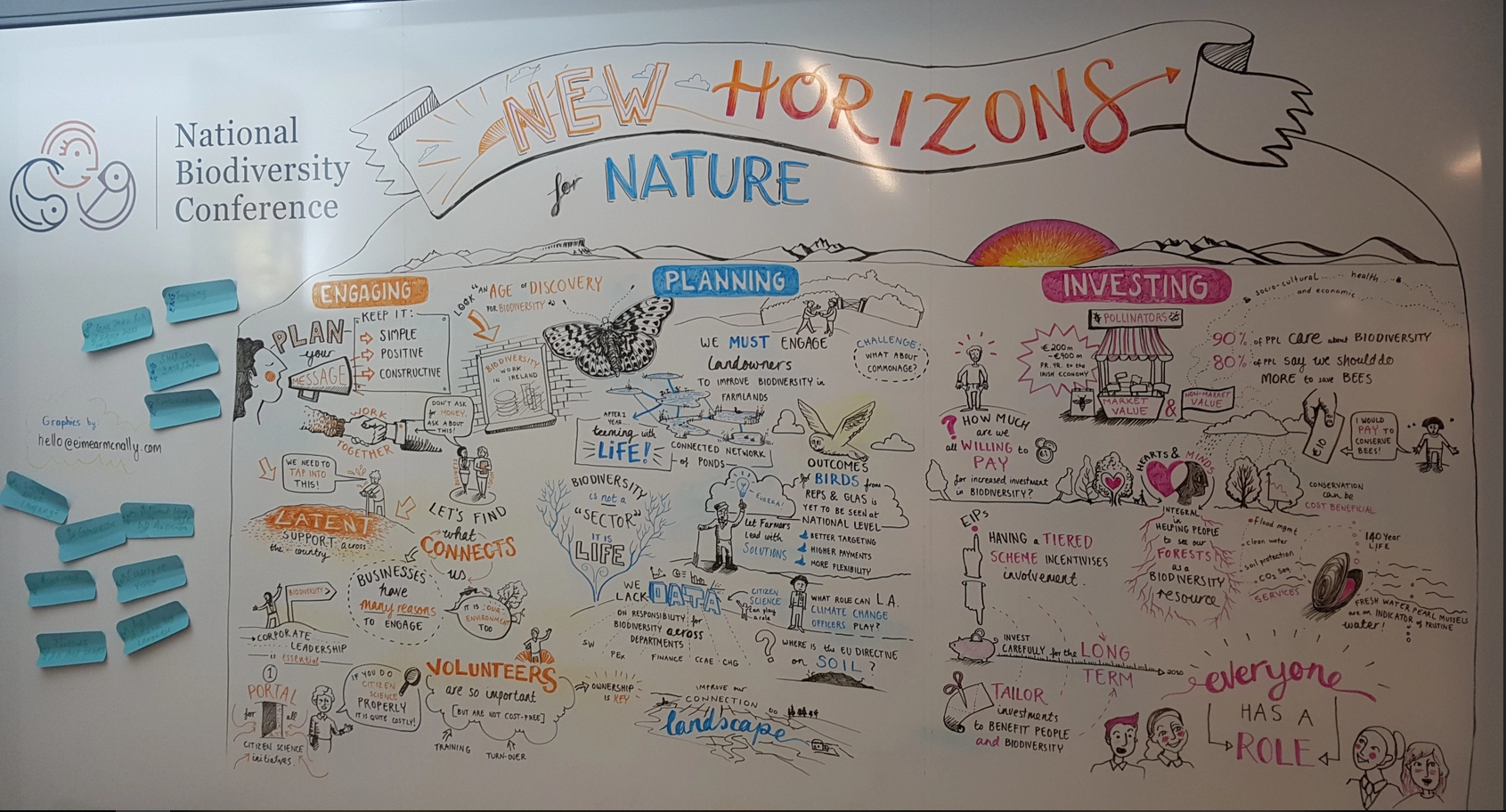
One Reply to “A New Horizon for Nature”